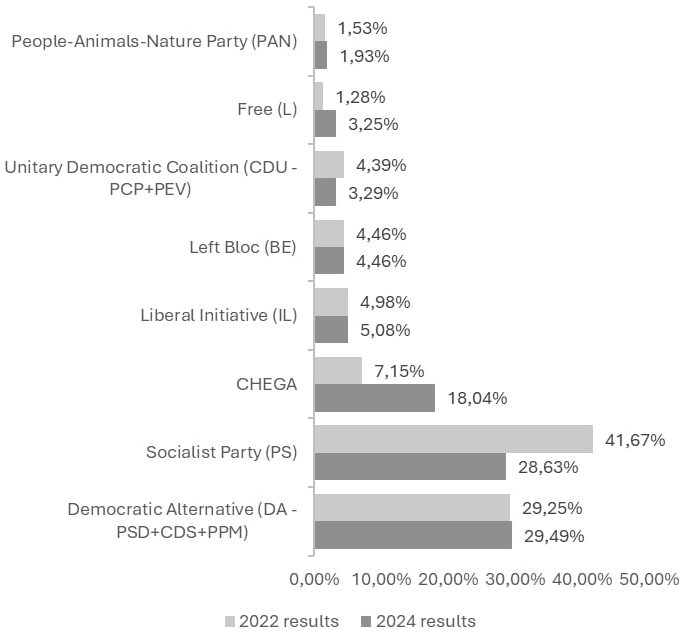The radical-right Chega party enjoyed a sharp rise in support during Portugal's recent parliamentary elections. With European elections coming up in June, Diogo Vieira Ferreira warns that support for Chega is likely to grow yet further
In November 2023, prominent members of António Costa's socialist government were investigated for corruption in lithium mining and hydrogen projects. Costa was forced to resign, and Portugal's President, Marcelo Rebelo de Sousa, dissolved parliament. The President called for snap elections, which took place on 10 March 2024.
Early electoral polls had suggested a victory for the right-wing coalition Democratic Alliance (DA), under the leadership of Luís Montenegro. This coalition is composed of the Social Democrat Party (PSD), the CDS-Popular Party (CDS-PP), and the Portuguese Monarch Party (PPM). But the most noteworthy revelation from the polls was an increase in support for radical-right Chega (Enough). Indeed, during the previous general election in 2022, Chega had already risen to become the third most voted-for party.
The graph below shows that the DA narrowly won the 2024 election, with 29.5%, against 28.7% for the PS. No party, however, won an absolute majority. Chega experienced a substantial increase in votes, from 7.18% in 2022 to 18.04% in 2024. As a result, 48 Chega members were elected to parliament. Discontent with mainstream parties during the Costa resignation crisis evidently drove support for nationalist and populist parties, particularly on the right.
Chega's surprise success may set the tone for the forthcoming European Union elections
Chega's surprise success may set the tone for the European Union elections in June. Portugal is not alone in confronting the rise of the populist radical right. Other prominent examples include Alternative für Deutschland (AfD) in Germany, Vox in Spain, Lega in Italy, and Rassemblement National in France.

Tensions are, therefore, rising concerning the likely growth in support for Chega in the EU elections. Chega has proclaimed its opposition to the EU, and it fits the typical political preferences of Eurosceptic radical-right parties. According to Chega’s manifesto on European integration, it supports the creation of a European Union of Sovereign Nations. This ‘Europe of Nations’ concept is widely defended by radical-right and far-right parties across the EU. Chega rejects the EU's political control, calls for limited reception of migrants and refugees, and rejects any EU-wide policy that promotes gender equality or 'Marxist tendencies'. The party opposes any federalist approach in European integration.
Chega rejects the EU's political control, calls for limited reception of migrants and refugees, and rejects any policy that promotes gender equality or 'Marxist tendencies'
Chega competed in EU elections for the first time in 2019 under the coalition Basta! (Enough!). On that occasion, it failed to win any seats. There is a high chance, however, that the party may secure a substantial number of MEPs in this year’s elections.
In July 2020, Chega made official its EU-wide affiliation with the nationalist and conservative Identity and Democracy (ID) party. ID is a European transnational federation of far-right parties that includes AfD, Lega, and Rassemblement National. A recent poll predicts that ID will become the third-largest group in the European Parliament, surpassing the liberal Renew Europe group.
In short, Chega could become one of the main vehicles for ID to win more seats in the European Parliament. The EP currently contains two Eurosceptic Portuguese parties: Left Bloc and the Portuguese Communist Party (PCP). Both belong to the radical left. If Chega wins at least one seat (and Left Bloc and PCP maintain theirs), Portugal will thus have three Eurosceptic parties in the European Parliament. Moreover, Chega would be the first radical-right party to represent the Portuguese state at EU level.
In general, smaller parties tend to win more support in EU elections than they do in national elections. The biggest potential winner in this year’s Portuguese elections is Chega. And, given current political instability, Portugal's radical right may grow yet further, mirroring political developments across the continent.
The year 2024 marks the 50th anniversary of the Carnation Revolution. This revolution ended 41 years of authoritarian rule, and led to the democratisation of Portugal. Chega’s electoral gains, along with the shift towards support for a radical-right ideology, suggest that a substantial number of citizens feel either nostalgia or fondness for the authoritarian regime. Indeed, during his recent election campaign, Chega leader André Ventura made constant reference to traditional attitudes.
The rise in support for a radical-right ideology in Portugal suggests many citizens feel nostalgia for the authoritarian regime of the previous century
There is a small possiblity that some good may come from the rise of far-right ideology in Portugal. It may mobilise the opposition, enhance civic engagement and increase voter turnout. But, of course, the continuing rise of the far right also boosts public support for radical-right ideals. What is certain is that Chega will pose a challenge for Portuguese democracy at national and European level.